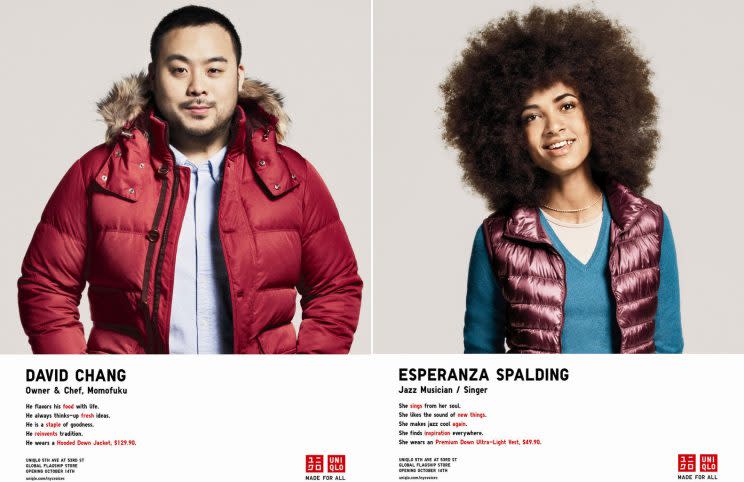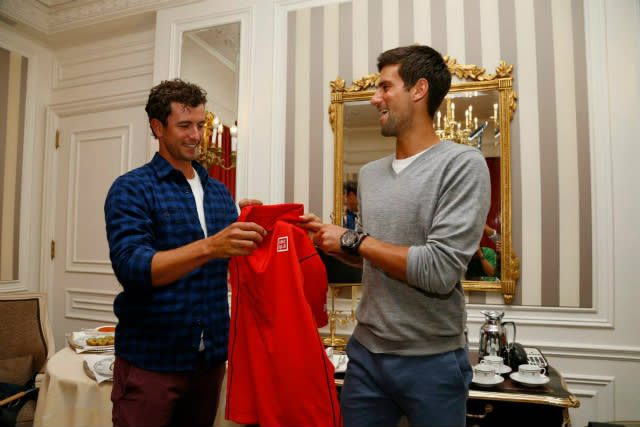The story behind Uniqlo's brand strategy, which includes tennis' No. 1 player
Novak Djokovic, the No. 1 tennis player in the world, achieved what’s known as a Career Grand Slam last month when he won the French Open, capturing all four of the sport’s Majors. And if you’ve been watching him play, you’ve likely seen the red, square logo all over his threads: Uniqlo.
It’s rare to see Uniqlo adorning the hats, shirts or shorts of star athletes. But the Japanese fast-fashion retail brand has seen great success with the few athletes it has signed. It’s no Nike, Adidas or Under Armour—but it doesn’t want to be. Uniqlo isn’t looking to build a broad roster of sponsored athletes. Rather, a spokesperson says it is merely a “coincidence” that all four of the company’s “global ambassadors” are pro athletes, and that all four are men.
Uniqlo (the name is a portmanteau of “unique clothing”) has been around since the 1940s, and is owned by Tokyo company Fast Retailing, which trades on the Tokyo and Hong Kong exchanges and is the parent company of other labels like J Brand and Theory. Uniqlo makes up nearly 80% of Fast Retailing’s revenue, which was about $14 billion in USD last year. Fast Retailing’s CEO is Tadashi Yanai, who has been praised for his management and happens to be the richest man in Japan. Yanai has a lofty goal of bringing Uniqlo to $10 billion in US sales by 2020.
Uniqlo has aggressively expanded into the US in its quest to take on H&M and other fast-fashion chains. It has just over 1,700 stores in 17 different countries. Not all have done well; Uniqlo recently shut five US stores, but all were in suburban shopping malls (in California, Connecticut, New Jersey, New York and Pennsylvania), suggesting it is simply suffering from the same retail death march that has bankrupted brands like Sports Authority and Eastern Mountain Sports. But in cities like New York and London, the stores are typically packed.
And rather than pay a mega-celebrity and use his or her face in a global ad campaign, like H&M did with David Beckham, Uniqlo has favored more quirky, artsy sponsorship ventures. In 2011, it launched a campaign in Manhattan with a “Uniqlo New York cast” of artists, entertainers or entrepreneurs famous in New York but not necessarily across the country. The cast included actors John Leguizamo and Laura Linney; Suchin Pak, founder of Hester Street Fair; jazz musician Esperanza Spalding; Joe Hall, founder of the Ghetto Film School; soccer player Carlos Mendes of the New York Red Bulls (now on the Cosmos); Shayna Crowell of Charity:water; Tumblr founder David Karp; and chef David Chang. It calls such people “local ambassadors” and used their faces in ads around the city.

When Uniqlo is opening a new store, “We like to work with local people who share the same values,” says Fast Retailing global spokesperson Aldo Liguori. “They could be artists, they could be entertainers, but they could also be important members of the local community. It makes the partnership more local and focused.”
In the same vein, Uniqlo gets involved in the arts scene in cities where it has stores. This month, London’s Tate Modern museum opened a new building, and Uniqlo was an official sponsor. On opening weekend, art commentators in Uniqlo T-shirts roamed the museum giving free, 5-minute talks about a single piece of art. In New York, Uniqlo sponsors Free Friday Nights at the Museum of Modern Art (MoMA). “We look at how we can make a difference to the local community,” Liguori says. “The local community could be London, it could be Antwerp in Belgium. We want to be a citizen of the community. With the Tate, it happened to be in the area of art, which we find in line with Uniqlo.”
And then there is Uniqlo Sports. Uniqlo’s four global brand ambassadors are: Serbian tennis player Novak Djokovic; Japanese tennis player Kei Nishikori; Japanese wheelchair tennis player Shingo Kunieda; and Australian golfer Adam Scott.
Of course, a company can’t control how its athletes perform in their sport, but a brand enjoys exposure and buzz when it adorns the top players, and Uniqlo’s guys are suddenly all at the top of their game. Scott won two PGA Tour events this year back to back and is ranked No. 8 in the world. Djokovic is world No. 1, just completed a career Grand Slam, and looks well poised at Wimbledon right now. Nishikori was a quarterfinalist at the Australian Open this year and is ranked No. 6 in the world; Kunieda is arguably the best-known wheelchair player and is ranked No. 6 in the sport.
Uniqlo is benefitting from these deals, but likely not spending much to have them. It scooped up Djokovic, to cite one example, in 2012 after he left Italian brand Sergio Tacchini. Prior to that, Djokovic had an Adidas deal, but the German giant chose to put more of its tennis budget on Andy Murray, who is now with Under Armour (UA) but made waves when he wore Adidas shoes last year at the US Open. It re-upped Nishikori this year with a reported $50 million contract. It signed Scott in 2013, and is likely getting him for cheap compared to the massive long-term deals Nike and Under Armour have given to golfers like Rory McIlroy and Jordan Spieth, respectively. (Scott has won more money on the PGA Tour this year than either of them.)

As Uniqlo combats a brutal retail market and aims to continue expanding, you might expect it to eye more athlete ambassadors. But Liguori says, “It’s not necessarily our primary objective to go for all sportsmen. It’s just that in our search to find global ambassadors, for us what is important is that the partner shares a common value about people. The philosophy and the thinking between us need to be similar, we feel. For us it’s deeper than just signing someone and having them wear our clothes.”
Liguori says the main rub is design. And the company is particularly focused on its Sports line at the moment, so the feedback it gets from athletes is key. “Sport is one area that we are pushing into because of the fabrics,” he says, “which wick away perspiration and are very light. You almost feel like you have an extra layer of skin that helps you during humid weather.”
Djokovic’s deal with the company includes some say in design, and the company utilizes its athletes as springboards to test new fabrics and performance gear. “Each of our sportsmen have their own requirements where their physical movement is concerned,” he says, “so we take their observations and feedback into our product design. How can we improve the items they wear, what feedback can they give us based on their experience playing in our clothes.”
Liguori adds, “It’s not like, because they’ve won, we double the deal.”
Maybe they should. Is Uniqlo doing too little with its sponsored athletes? The brand is sitting on a gold mine of marketability with Scott’s movie-star good looks and Djokovic’s dominance on the court, and it is underplaying its hand. But it doesn’t want to be known as a sports brand. It’s fast fashion. With its four stellar athletes, it is playing the long game.
—
Daniel Roberts is a writer at Yahoo Finance, covering sports business and technology. Follow him on Twitter at @readDanwrite.
Read more:
Adidas is on an ironic hot-streak in golf
Maria Sharapova and 5 other athletes Nike dropped
Corporate America is drooling over these 2 Mets pitchers– and their hair
